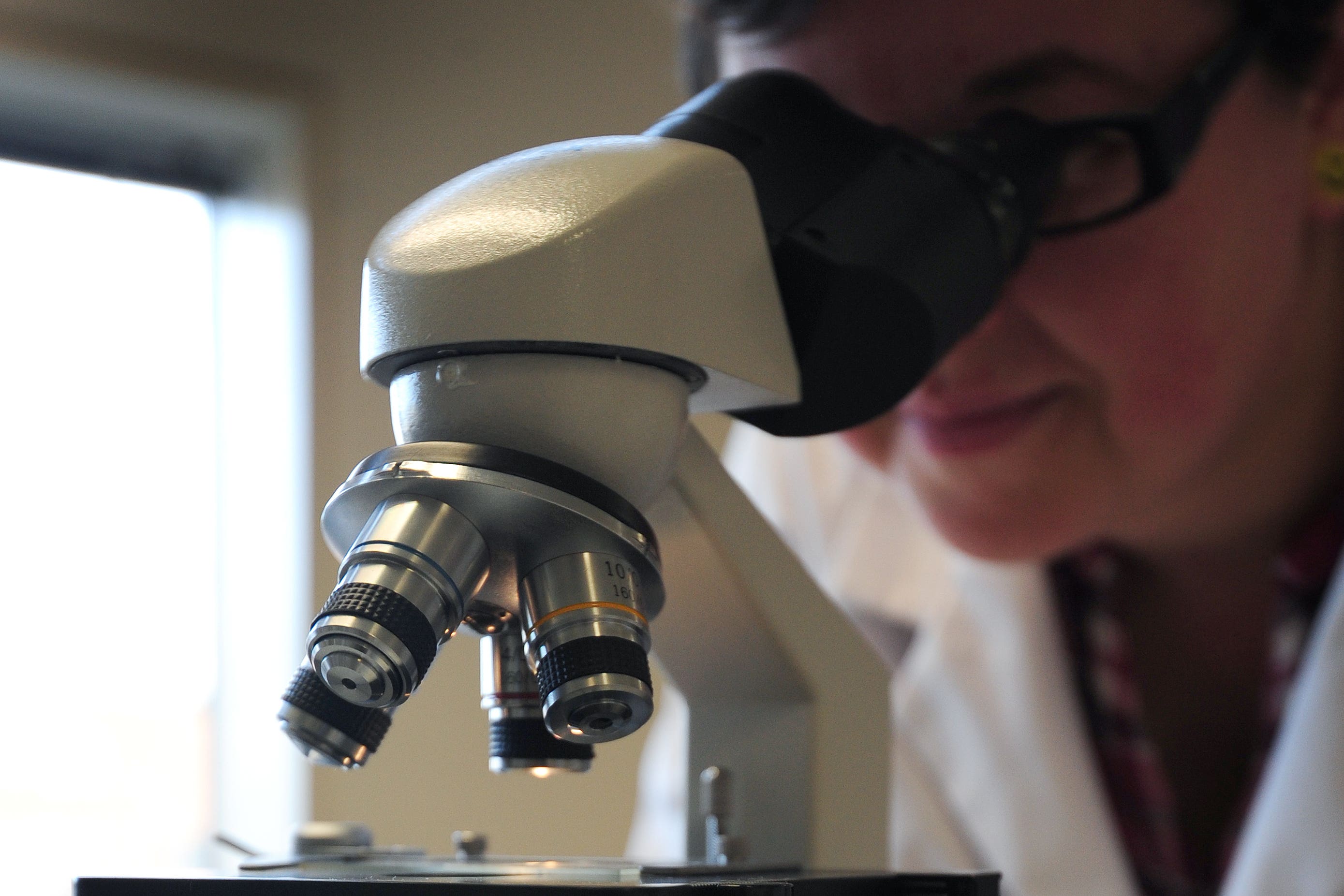‘Game-changer’ test spots signs of motor neurone disease before symptoms – study
Detecting the condition at its earliest stages opened the door for more effective treatments, experts said.

A test that spots signs of motor neurone disease before symptoms appear has been hailed a “game changer” by scientists developing it.
The tool, known as TDP-43 aptamer, is able to detect damaged cell proteins in brain tissue samples.
Researchers said these proteins are indicators, or biomarkers, of MND that can be spotted before cells begin to malfunction and symptoms start to appear.
Our findings have implications for early diagnostics and intervention prior to symptom onset in MND. With better ability to detect disease, we might be able to diagnose people with MND earlier, when therapeutic drugs might be much more effective
They said that detecting the condition at its earliest stages opened the door for more effective treatments.
Dr Holly Spence, from the University of Aberdeen, said: “Our findings have implications for early diagnostics and intervention prior to symptom onset in MND.
“With better ability to detect disease, we might be able to diagnose people with MND earlier, when therapeutic drugs might be much more effective.”
MND affects around 5,000 people in the UK.
This tool 'targets' the disease protein and allows us to see where toxic clumps are building up in the body. It can do this for much lower amounts of disease proteins, and with greater accuracy than ever before
There’s no cure for the condition, but treatments can help reduce its impact on a person’s daily life.
It is caused by a build-up of certain proteins in the brain that clump together, causing the cells to gradually stop working.
Symptoms include impaired movement, thinking and breathing, which worsens over time.
The “aptamer” lab test works by identifying abnormal protein clumps in a brain tissue sample taken from a patient during biopsy.
The researchers said their test could pick up indicators of MND earlier and with more sensitivity than methods currently used.
Dr Jenna Gregory, from the University of Aberdeen, said: “This tool ‘targets’ the disease protein and allows us to see where toxic clumps are building up in the body.
This could be a game changer for MND research, diagnostics and treatment
“It can do this for much lower amounts of disease proteins, and with greater accuracy than ever before.
“This could be a game changer for MND research, diagnostics and treatment.”
The research was funded by Target ALS and is published in the journal Acta Neuropathologica.
Commenting on the research, Dr Brian Dickie, director of research at the Motor Neurone Disease Association, said: “It often takes a year from the first onset of symptoms to receiving a diagnosis of MND.
“This innovative research into the early cellular changes occurring in MND offers exciting potential for the development of new tests to help reduce diagnostic delay.
Due to advancements in research, many potential treatments are currently being explored in the lab and in clinical trials. However, we now need robust biomarkers of disease to support the evaluation of these treatments and to speed up diagnosis
“As treatment does not begin until the disease is diagnosed, earlier intervention will hopefully also mean that treatments are more effective.”
Jessica Lee, director of research at the My Name’5 Doddie Foundation – set up by the late Scottish rugby union player Doddie Weir – added: “Motor neurone disease is a devastating condition for which there are currently no effective treatments and long delays in diagnosis.
“Due to advancements in research, many potential treatments are currently being explored in the lab and in clinical trials.
“However, we now need robust biomarkers of disease to support the evaluation of these treatments and to speed up diagnosis, so that treatments can be started earlier in disease progression.
“This exciting new technology holds promise to do just that.”
Weir was “horrified at the lack of hope” given to people diagnosed with MND, his friend said.
Jill Douglas, chief executive of the My Name’5 Doddie charity, said that the organisation was “cautiously excited” by the development, but told Sky News: “There’s a lack of hope for people within the MND community and so there is a tendency sometimes to be very excited about news like this – we have to approach it with caution until we better understand what its implications might be.”
She added: “There needs to be a real concerted effort to do something for this disease and we feel as though we are on the cusp of a breakthrough for emerging treatments. We just need to keep the foot on the pedal.
“When Doddie was diagnosed, he was horrified at the lack of hope afforded people who are given this brutal diagnosis that there are no treatments – the one drug that has been prescribed adds two or three months to your life expectancy.
“So he wanted to really make a difference, to shine a light on the disease, which I think he did, really raising the profile.
“He was an incredible character, Doddie, and his legacy goes on. He didn’t want us to stop. He said, ‘Keep going, we need to shine a light on this disease, we need to help people who are given this awful diagnosis and one day work towards effective treatments and a cure’.”
She added: “You’ll have seen some of the people who’ve been struck by this awful disease, my great friend, Doddie – to see a giant of a man like that felled by it was was really hard for everybody.
“And also we see Rob Burrow and how bravely he’s taking on MND and with the help of his great friend, Kevin Sinfield.”